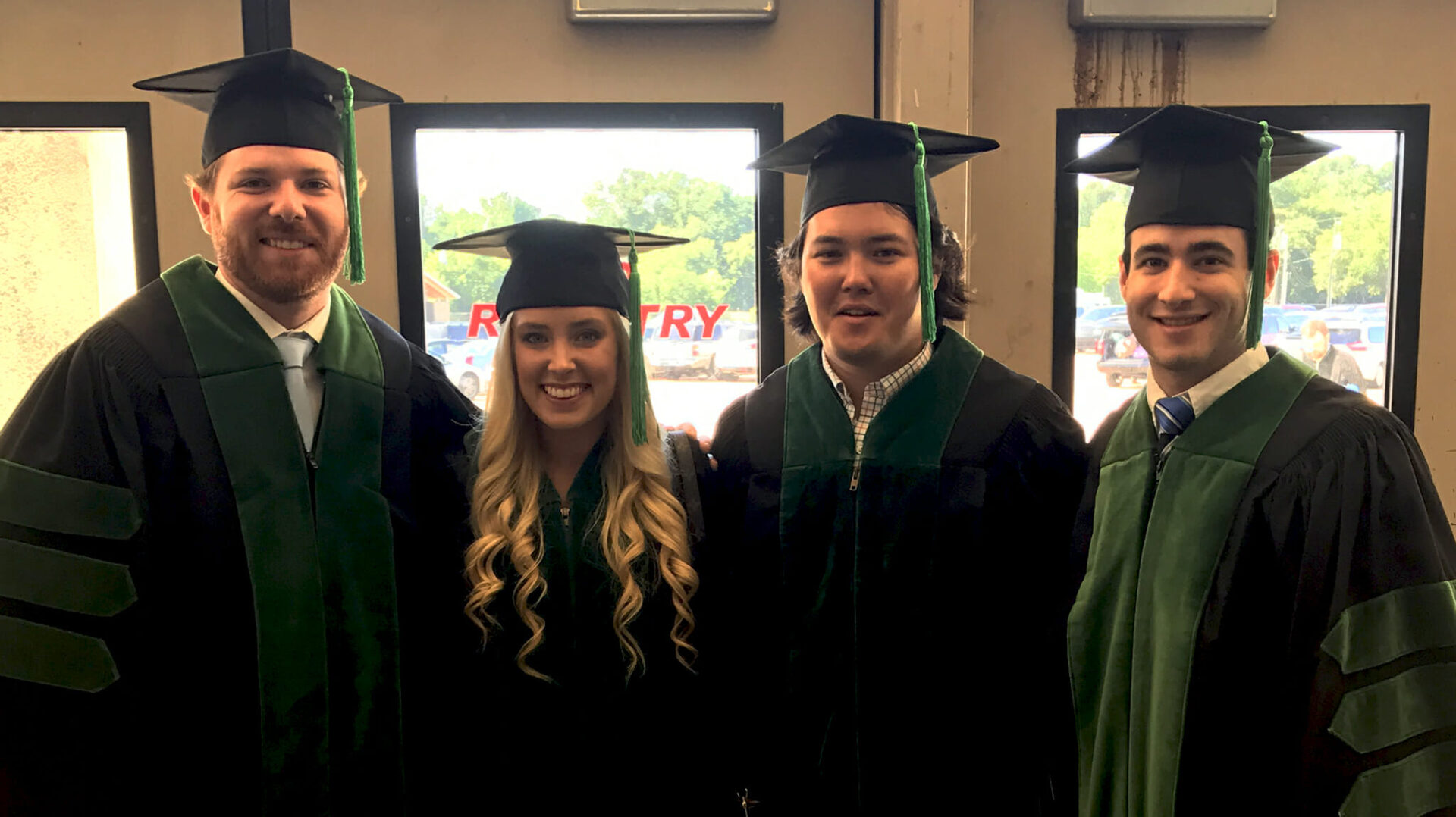Headlines
The Engineer Will See You Now

UM engineering graduates who are now medical doctors include, from left, Drs. Brooks Turner at Halifax Medical Center, Jennie Katherine Ellis Lofton at UMMC, Steve Faulks at the University of Florida College of Medicine and Cameron Bonds at North Mississippi Medical Center. Submitted photo
Like several other fellow UM graduates, he chose the medical field, which he viewed as a combination of altruism and science, similar to engineering.
He practices family medicine at the Halifax Medical Center in Daytona Beach, Florida.
“I believe the critical-thinking skills I acquired in engineering have played a major role in preparing me for the medical field,” Turner said. “The system-based approach to problem solving has definitely helped me in evaluating clinical scenarios.”
Beyond problem solving, much of the daily work of an engineer mirrors that of physicians, said Dr. Cameron Bonds, who earned his bachelor’s degree in chemical engineering in 2013.
“I use my background in chemical engineering daily in the medical field,” said Bonds, a resident at North Mississippi Medical Center in Tupelo. “Our bodies are very similar to chemical plants in that we have pumps – hearts – with differing pressure gradients, gas exchangers – lungs – and pipes – vasculature system – with varying diffusion capabilities.
“These physiologic components of medicine go hand in hand with chemical engineering principles, and are just a few examples of how the knowledge I gained through Ole Miss engineering better prepared me to help improve healthcare daily in our state.”
Faculty in the School of Engineering strive to give graduates a wide range of skills to succeed in any career field, Dean Alex Cheng said.
“Ole Miss engineering is one of the few programs in the nation that stresses a broad-based education that is anchored on liberal arts,” Cheng said. “We train students not only for their technical skills but also for their critical thinking and lifelong learning abilities.
“These trainings make them strong candidates in law, medicine, public policy and entrepreneurship careers.”
Dr. Ellis Lofton, a psychiatrist at the University of Mississippi Medical Center, graduated from Ole Miss in 2013 as a general engineering major. She said she believes there can be a misunderstanding when it comes to general engineers and their career paths.
“I think there is a misconception that you have to major in biology or chemistry to gain acceptance into medical school,” Lofton said. “However, I don’t believe that is the case.
“While my medical school class did have a significant proportion of students with science backgrounds, we also had students with backgrounds in engineering, architecture, law and seminary.”
Her engineering undergraduate skills, similar to Turner’s, also taught her to approach and handle challenges, which has benefited her medical career.
“I think one of the greatest things I learned in my engineering studies was how to problem solve,” Lofton said. “Now, I use those same problem-solving skills from undergraduate to work with patients and find what therapies and treatments work best.”
The medical field is open to engineers, and Turner said he hopes future undergraduates will take advantage of it.
“I would definitely encourage students to strongly consider engineering as a pathway to medicine,” Turner said. “It’ll prepare you to critically think when problem solving, allow you to tailor your pre-med undergraduate schedule in a way that fits your plans for taking the MCAT and applying for medical school, and it will most certainly help your resume and application stand out.”
The general engineering path provides a great foundation for a number of careers, said Dr. Steve Faulks, who earned a Bachelor of Engineering in 2011 and an MBA in 2013, both at Ole Miss.
“I loved majoring in general engineering at Ole Miss,” said Faulks, a resident in family medicine at the University of Florida College of Medicine in Gainesville, Florida. “I’ve found it to be great preparation for any number of career fields, be it medicine, the business world or any opportunity one would want to pursue. Ole Miss engineering can get you there.”
Although they chose to build careers in another field, the success of these four graduates reflects the high quality of programs both in the School of Engineering and across campus, said Marni Kendricks, the school’s assistant dean for undergraduate academics.
“Although our students graduate well-prepared for careers as professional engineers, many of them discover things they are passionate about while on campus that lead them in different directions,” Kendricks said. “Because we are a liberal arts-centered university, we offer a different atmosphere that encourages students to explore their interests and possibilities.
“Many of our alumni are respected engineers, but it’s not uncommon for our graduates to build successful careers in other fields, including medicine, business and even law. It is such a pleasure to be part of their academic journey and to help them discover their place in the world.”
By Karoline Kouk and Mitchell Diggs





























